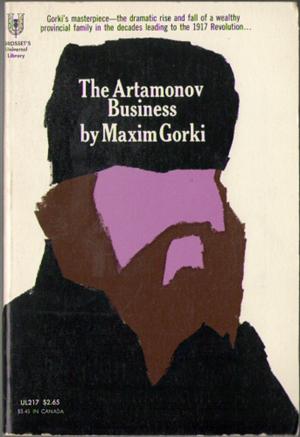I have a real weak spot for Russian literature, for some reason. I have enjoyed almost all of it I have read, although I greatly preferred Anna Karenina to War and Peace. Last year, though, I made a run at The Brothers Karamazov, and although I had thoroughly enjoyed both Crime and Punishment and The Idiot, I found I got bogged down and never got through it. I mean, I was three or four hundred pages in, and very little had happened! Some day, I may try to go back, but for the moment, I'm content to let that one lie.
I had never read any Maxim Gorky, however, so when The Artamonov Business showed up on one of my lists, I was interested to see how it would compare to other works I'd read. At the beginning, it reminded me of The Brothers Karamazov in that it was about three brothers, one of whom wanted to become a monk, and the father was overbearing, if not as awful as the Father Karamazov. This, thankfully, was both much shorter, and a much breezier read. Not a light read, but any means, but not one that made me struggle.
The Artamonov Business takes place at a certain point in Russian history, when the muzhiks, the serfs, were liberated from the feudal system that had persisted to that point. In a town of roughly middle-class people, the senior Artamonov (I regret to say that the names have not stayed with me) comes with his three sons to set up a new business. He was liberated by that edict, and believes that by sheer force of will, he can prosper in this new economic system. And largely, he does, although the outcome may be more to the side of wealth than happiness.
Those in the town are put off by his manners and his insistence on doing things his own way, as he sets up a factory under their noses, marries his son to the daughter of the mayor (killing the mayor from grief/confusion in the process) and brings in workers to manufacture his goods. It is interesting to read (from Wikipedia, I'm not doing a deep dive here) that Gorky was hailed by the Communists (although he was also exiled from the Soviet Union) as a model writer, as the rise of the muzhiks is shown to be not without its difficulties. The coming revolution doesn't seem to be any more assured or confident in what it will bring. It does seem to be more and more inevitable as the book goes on, but the message is more complex that that it will just be a good thing.
The Father dies fairly early in the novel, and it is up to his sons (well, two sons and one nephew, who is treated as a son) to carry on his legacy, without ever being quite sure what that legacy is or if they want it. Peter does what his father wanted, but doesn't enjoy it, and finds himself prone to at least a few binges to let off the stress that has been building for years. The middle son joins a monastery, but appears to lose his deep faith, even as the monks want to use him as a model. The youngest, the nephew, seems more centered, I guess, but we spend the least time with him.
What laws there are and whether or not they can be transgressed, are all up in the air, and the Artamonovs are far from sure. This even extends to cold-blooded murder, which one of the brothers commits, and hides for decades, justifying it to himself in ugly terms.
I'm not sure I know enough about the time period Gorki is writing about, or in, to say anything deeper, but I really quite enjoyed this book, and can add it to the list of Russian literature that I have liked reading. Someday, maybe The Brothers Karamazov will join that list. Maybe.

No comments:
Post a Comment